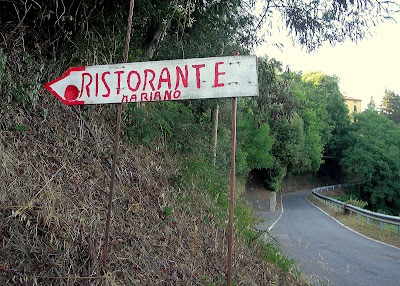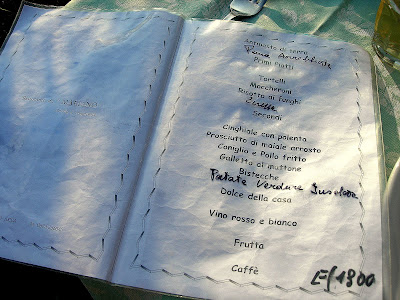23 August 2011
On the Road to Find Out 2
(Continued from Part 1.)
Lucca. Lucca, Italy. Lucca, Italy is in Tuscany. Tuscany is pretty. Like most cities in Italy, Lucca is an old city. Lucca is also a walled city.
That's about all I knew about Lucca before dropping down that way and about all I know about Lucca now. But a two week flurry of activity passed after visiting the Beaujolais and I knew we needed a break. Two weeks of the end of school year busyness and, for me, the end of a job that should have been wrapped up a month earlier. The end of June culminated with a storm of schedules and commitments and obligations and I wanted none of it, so in a period of about 36 hours the decision was made, an apartment rented, the car packed, and Hank and I headed for Lucca.
Lucca was chosen almost randomly. Some friends of ours chose Lucca as a place to stay for a week after some sort of giant birthday bash they threw for each other up north in the Piedmont. The possibility of seeing friends, an apartment with a pool, and a New York Times article about how Lucca is the epicenter of Tuscan cuisine were enough reasons to fill the gas tank and go. And in a long and groggy blink of an eye we arrived.
Dad's tired feet and one happy swimmer:
With the first plunge out of the way we settled in on finding some Lucchese cuisine. Instead, we found pizza and a wine bar that served cold appetizers and wine from the tank. Close enough.
The food experiences continued positively but nothing like the Piedmont, Rome, or even meals I've had in the Aosta. With a seven year-old in tow I knew I couldn't expect too much; three-hour meals don't sit well with a boy who has difficulties giving a slice of pizza the time and focus it deserves.
I wanted to dedicate at least one lunch to eating well so using the New York Times article I chose La Mora, the best of the best. With map in hand, Hank and I drove out to Ponte a Moriano, a small commune about 15 kilometers from Lucca. The day was hot and when we arrived the town was deserted. I knew we were running late though still ahead of the two o'clock closing hour for lunch service. But the doors to La Mora were locked, the blinds drawn, and I feared we'd be eating the ubiquitous doner kebabs back in town. Luckily, just down the road from La Mora, the doors of the Antica Locanda di Sesto trattoria were still open. Lunch was saved.
The meal was excellent: house raviolis stuffed with truffles and walnuts; marinated anchovies with white beans; sheep's milk cheeses from the region; even Hank's spaghetti pomodoro was "the best ever!" The family run trattoria operates within a building that dates back to 1368. In addition to the restaurant, the Barattini family makes their own olive oil, small batches of wine, sheep's milk cheese, and cured meats. Plus, they couldn't be friendlier.
As for La Mora, its story is not as positive. I was informed that after a difficult period two years ago that saw several changes in chefs, the celebrated and beloved owner took his own life somewhere near the quiet river that flows close to town. Lamberto Barattini told me it was a shock and great tragedy for the entire community. La Mora will not reopen.
The following day, the proprietor of the villa, a stocky, handsome Sicilian, pointed out some deer grazing in a lower meadow. "Sometimes," he said, "you also see wild boar running through there."
"Wild boar," I said. "Those make for good eating."
"You like eating boar? Would you like to eat boar? I could make you a reservation at a restaurant very close to here. It is an honest place and not so expensive. You can eat wild boar."
An honest place. I wasn't totally sure what the Sicilian meant by that but I liked the idea. I also liked the idea of eating boar.
Later that day I was given a hand drawn map to the honest place. This consisted of two lines that formed an upside down 'y' on the page. The short end represented the road that led to the villa. At the intersection was an arrow that pointed off the page toward Lucca. The long side squiggled up the page and ended at a small box that read Mariano. This was the restaurant. The squiggly line signaled a drive up a winding road in the foothills until you saw the restaurant. "There is a sign along the road," said the Sicilian, "you can't miss it."
By a single squiggly line he meant a single road with many opportunities to take wrong turns at other junctions not represented on the map. By a sign he meant a small, hand-painted board tucked into some brush at a bend in the road that you could easily pass. By a restaurant he meant someone's backyard with enough altitude that it faced the other side of Lucca's hills toward Viareggio and the Mediterranean Sea. Perfect.
The light was blinding, the day's heat waning. At 7:30 pm we were only the second table but by the time we left at 10:00 the backyard was full.
The tables were the green plastic kind and off-kilter. The wine list consisted of a white and a red made somewhere on the hilltop and served in large carafes and heavy water glasses. The entrance to the kitchen was the back entrance to the house and doubled as a workspace for the garden. You could hear the dishwasher running and the conversations of the women inside while they cooked the night's meals and cleaned up afterwards. It was an honest place.
The food, like everything else, was sincere and generous. It will never compete for the one Michelin star left after the demise of La Mora but it will never pretend to, either. It was the kind of food you would expect to eat while relaxing in someone's backyard in the Tuscan foothills watching the sun go down on the Mediterranean. Probably most things were grown, raised, hunted, and foraged within close proximity to the restaurant. The tomatoes were some of the reddest and richest I've ever eaten. The limoncello was neon green from the fresh laurel, oregano, and sage infused into the drink. Everything reflected sunshine.
The next morning we found our only neighbors, a Dutch family who has spent the last seven years staying at the same villa for three weeks at a time. They had a son two years younger than Hank and a daughter of the same age. Thus began the summer love affair that included rescuing tiny frogs every morning that fell into the pool, shared art projects, and making do with different languages.
From the parents I learned more about the city in 30 minutes than I had the entire 36 hours of planning our vacation. For example, Lucca holds an outdoor Summer Music Festival every year in the center of the city. Yes, Martin thought, the festival should have started already. A quick search on his computer-phone-communicator thingy told us that, in fact, there was a concert the next day. Burt Bacharach. Would I like to go? The week was sealed.
I like Burt Bacharach's music. I didn't hesitate to buy tickets. I never thought about seeing Burt Bacharach live and, truth be told, I wouldn't have gone out of my way to see a show. He's a composer and not as well known as a performer. But of course we went. It was Burt Bacharach playing with a full band and three singers in the middle of an ancient Etruscan city. Yes, we went. No, they didn't allow cameras.
In short, Burt was great. Burt is old but his songs don't age. He started with a few medleys and I was worried for a Las Vegas-style revue. Then gears changed and the three vocalists--Josie James, John Pagano, and Donna Taylor--took turns fleshing out full songs. The vocalists then took a break while Burt and his band played a half-hour's worth of film music. The vocalists returned for another hour or so and an additional two encores. In total, Burt (I call him Burt) played for close to three hours, not bad for an 83 year-old.
There was a point toward the end of the concert when Burt played the piano and sang, without any other accompaniment, the sweetly philosophical "Alfie." Though his 83 year-old voice struggled in the higher register, the song, both music and lyrics, was delivered with wistful and delicate beauty. Sitting in Lucca's Piazza Napoleone under the clear, warm, July sky, with Hank falling asleep on my lap, I couldn't have imagined a better way to experience the relief of contentment.
(Continue to Part 3.)
Subscribe to:
Post Comments (Atom)















1 comment:
So is Italian in Hank's language repertoire now?
Post a Comment